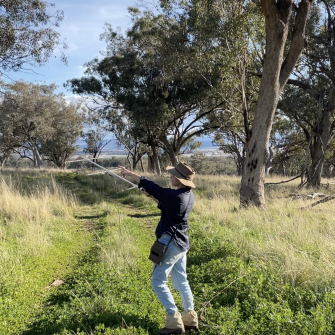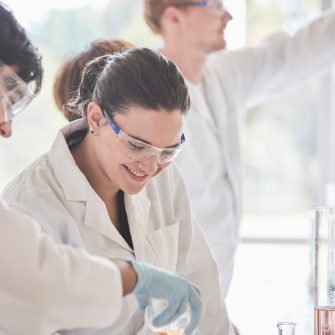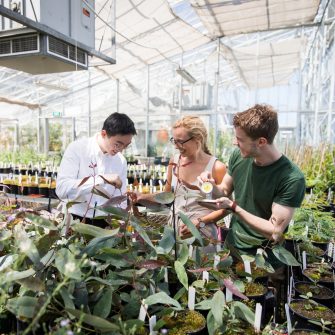Bachelor of Medical Science
- Commencing Terms
- Term 1
- Duration
- 3 Year(s)
- Delivery Mode
- Face-to-face (includes blended)
- Campus
-
Kensington
- Codes
- UAC code 429700
- Program code 3991
- CRICOS code 030459E
-
ATAR/2025 lowest selection rank
- 88.0 View all admission criteria
-
2026 Indicative first year full fee
- $9,000*
-
2026 Indicative full fee to complete degree
- $29,500*
-
2026 Indicative first year full fee
- $62,500*
-
2026 Indicative full fee to complete degree
- $198,500*
Application closures for 2026
International applications for all undergraduate programs, as well as postgraduate programs offered by the faculties of Arts, Design & Architecture, Engineering (excluding Master of Information Technology and associated programs) and Science are now closed to New Overseas Student Commencement (NOSC) for 2026 intakes.
Postgraduate programs offered by the Business School and the faculties of Law & Justice and Medicine & Health remain open. Master of Information Technology (and associated programs) also remain open.
- Overview
- Entry requirements
- What will I study?
- Future careers
- How to apply
- Fees & Scholarships
Overview
If you're fascinated by how the human body works and want to play a role in advancing healthcare, the Bachelor of Medical Science at UNSW is a strong first step. This degree explores the science behind human biology, disease and drug treatments, combining core disciplines like physiology, pathology, pharmacology and genetics.
Across three years of full-time study, you’ll uncover how our bodies develop, defend against disease and respond to medical interventions. You’ll gain hands-on experience in cutting-edge labs and learn from leading researchers in medical science. Flexible study options allow you to tailor your medical science degree to your interests, with majors in neuroscience, microbiology, immunology and more.
Whether you're planning a career in biomedical research or looking to pursue postgraduate study in medicine, dentistry, pharmacy or public health, this program sets a solid foundation. UNSW graduates are well-equipped to work in research institutes, hospitals, biotech firms and public health agencies – tackling real-world health problems and driving progress for all across the medical field.
Interested in becoming a practising medical doctor? Consider the Bachelor of Medical Studies/Doctor of Medicine at UNSW.
Key features
Build in-demand skills for a future in health and research
This medical science degree is co-developed by UNSW Science and UNSW Medicine & Health, combining world-class expertise across pharmacology, pathology, neuroscience and genetics. Tailor your learning with optional majors and gain transferable skills in analysis, lab techniques and scientific communication.
Get hands-on experience before you graduate
Apply your knowledge in real-world settings through Work Integrated Learning (WIL). Intern with biotech firms, government departments or start-ups, or complete a research internship as part of a leading research team. You’ll build career-ready skills while earning course credit.
Graduate with an edge in a growing industry
UNSW has been recognised for producing Australia’s most employable graduates six years in a row (Australian Financial Review (AFR) Top100 Future Leaders Awards, 2020-2025). Whether you're heading into research, biotech, lab work or health policy, studying a medical science degree at UNSW sets you up for success.
Why study at UNSW?
Study at a global top 20 university
Join a global top 20 university (QS World University Rankings, 2024–2026) and learn from experts who are driving scientific breakthroughs. UNSW Science and UNSW Medicine & Health are at the forefront of innovation, offering access to cutting-edge labs, clinics and simulation facilities.
Be part of a thriving research community
UNSW’s School of Biomedical Sciences – the largest within UNSW Medicine & Health – connects you with pioneering researchers and healthcare professionals. You’ll have opportunities to contribute to research projects and explore the intersection of science, health and community impact at facilities like the UNSW Lifestyle Clinic.
Connect with a powerful industry network
Start building your professional future with access to more than 400 industry and research partners. From guest lectures and mentoring to exclusive internship opportunities, UNSW gives you the connections and confidence to thrive in the health and science sectors.
Want to see more from UNSW Science?
Entry requirements
-
- The 2025 Lowest Selection Rank (LSR) is the adjusted rank (ATAR plus adjustment factors) you would have needed to gain entry to this degree in 2025.
- The 2025 A levels score is based on four Advanced Level (A2) subjects. Entry scores are calculated from the best three or four A2 subjects (excluding repeated subjects) using the following values: A*=6, A=5, B=4, C=3, D=2, E=1. At most one Applied A Level subject may be included in the best four subjects used to calculate the aggregate.
- The 2025 IB Diploma is an indication of the IB you would have needed to gain entry to this degree in 2025. It is to be used as a guide only.
- The 2025 Lowest ATAR is the lowest ATAR (before adjustment factors were applied) to which an offer was made. Where <5 is listed, this indicates that less than 5 ATAR-based offers were made and so the score has not been published. N/A indicates no offers were made on the basis of ATAR.
*The Lowest ATAR to which an offer was made, for this program, is based on a UNSW Gateway Early Conditional Offer.
-
At UNSW, we are committed to ensuring prospective students have all the information they need in order to make informed decisions about their study options.
To assist you in gaining a better understanding of how Admissions works at UNSW, we have provided you with a summary of ATAR offers and the student profile.
We hope this information will help you identify the degree that is right for you.
Assumed knowledge
Chemistry, Mathematics Advanced
Adjustment Factors
We offer a range of adjustment factor schemes that reward students for academic performance and extra-curricular achievements. These schemes also take into account a range of personal and educational disadvantages that may have affected your studies.
HSC Plus
This scheme rewards students who perform well in Year 12 subjects that are relevant to their preferred UNSW degree. You may be awarded up to five points.
Elite Athletes, Performers and Leaders (EAPL)
This program recognises achievements in the areas of sport, academia, leadership and music at an elite level. You may be eligible for up to five points.
Educational Access Scheme (EAS)
Factors such as illness, financial hardship, language difficulties or attending a particular school can mean you don't always get the best possible marks in Years 11 and 12. If one of these situations applies to you, submit an application for the Educational Access Scheme (EAS) via UAC. Eligible students can receive between 1 and 10 points towards their chosen UNSW degree.
Admission pathways
Your ATAR is not the only measure of your potential to succeed, which is why we offer a range of pathways into university. Explore your options below and get in touch with our Future Student Advisers to discuss your path to UNSW.
Gateway Admission Pathway
This scheme is open to students who attend Gateway schools, live in a low-socioeconomic area based on IRSAD and IEO indexes of SEIFA criteria, or are an Aboriginal and Torres Strait Islander person. It adjusts the ATAR requirements for your preferred UNSW degree and provides early offers and early conditional offers to UNSW.
Entry programs for Australian Aboriginal and Torres Strait Islander people
We offer entry programs for Indigenous Australians, including the Indigenous Preparatory Programs and the Indigenous Admission Scheme (IAS). The entry pathway program you apply for will depend on the degree you want to study.
English language requirements
You may be asked to provide evidence of your English proficiency to study at UNSW depending on your educational background and citizenship. English language skills are vitally important for coping with lectures, tutorials, assignments and examinations - this is why UNSW requires a minimum English language competency for enrolment.
If you’re completing an Australian Year 12 qualification (e.g. NSW HSC or equivalent), you do not need to provide anything extra to prove your proficiency. Your qualification will be used as evidence of your English proficiency.
If you do need to provide evidence of your English proficiency, this will be indicated in your application. You can prove this by providing evidence that you meet one or more of the following criteria:
- English language tests and university English courses
- Prior study in the medium of English
- Other qualifications
If you need to improve your English skills before you start your degree, UNSW College’s Academic English Programs are for you. The programs are suitable for various English levels and help you prepare for university studies and life in Australia.
For more details, visit the English Language Requirements page.
International direct entry
Information for applicants with CBSE, HKDSE or Singapore A Levels Qualification
Calculating your CBSE Score:
Awarded by CBSE, average percentage marks across English or Hindi, and your best four remaining subjects. Where marks are given as a range, the mid-point for that range is used e.g. 75 to 80 = 77.5.
Calculating your HKDSE Score:
Entry requirements are based on the aggregate of the best 5 achieved category A subjects (category B and C subjects are not considered).
For subjects other than Citizenship and Social Development: level 5**=7 points, level 5*=6 points, level 5=5 points, level 4=4 points, level 3=3 points, level 2=2 points, level 1=1 point, Level U=0 point.
For subject Citizenship and Social Development: Attained=2 points, Unattained=0 point. Citizenship and Social Development will only be counted towards the aggregate if the 2 points awarded for Attained ranks among the student’s best five scoring subjects.
If Mathematics Compulsory Part and Extended Part (Module 1 or 2) are both presented, both scores can be counted.
Calculating your Singapore A Levels:
Due to significant changes to the GCE A-Level Curriculum and University Admissions Score (UAS) calculation effective 2026, UNSW assessment is currently under review.
Note: Entry requirements published on this page are correct as of the day of publication and may change without notice.
We do not accept secondary qualifications from this country. We may accept tertiary study results, please contact us for more information.
Please contact us for direct entry requirements.
Admission pathways
If you do not meet the requirements for direct entry into your chosen degree, you may be eligible for a pathway program with UNSW College. UNSW College provides alternative entry options using university-approved content so that you can start your UNSW journey with confidence.
English language requirements
You may be asked to provide evidence of your English proficiency to study at UNSW depending on whether you are from an English-speaking background or non-English speaking background. English language skills are vitally important for coping with lectures, tutorials, assignments and examinations - this is why UNSW requires a minimum English language competency for enrolment.
If English is not your first language, you’ll need to provide proof of your English proficiency before you can be given an offer to study at UNSW. You can do this by providing evidence that you meet one or more of the following criteria:
- English language tests and university English courses
- Prior study in the medium of English
- Other qualifications
If you need to improve your English skills before you start your degree, UNSW College’s Academic English Programs are for you. The programs are suitable for various English levels and help you prepare for university studies and life in Australia.
For more details, visit the English Language Requirements page.
Check the specific English language requirements for this program
What will I study?
UNSW is introducing a new academic calendar from 2028.
We are moving to a new flex-semester calendar. What does this mean for your studies?
Program structure
The Bachelor of Medical Science at UNSW consists of 144 Units of Credit (UOC). You’ll have the option to complete a single or double major, plus a range of electives and general education courses to round out your studies. The program can be completed in three years when studying full-time, with the option to study part-time over an extended period.
The course gives students a taste of the knowledge and experiences they’ll encounter in their future careers. Whether your career path in healthcare is clear or a work-in-progress, a Bachelor of Medical Science gives you the tools, guidance and connections to find success in immunology, neuroscience, biochemistry, biomedical science and many other areas of medicine.
Full program structure
The Bachelor of Medical Science is made up of 24 courses taken over three years of full-time study.
Type |
Units of Credit (UOC) |
Number of courses |
Major |
114 |
19 |
Science electives |
6 |
1 |
Free electives |
12 |
2 |
General education |
12 |
2 |
Majors
-
Study the structures of the human body. This major covers:
- gross anatomy (form, arrangement and function of the bones, joints, muscles and internal organs)
- histology (microscopic structure of tissues and cells)
- embryology (development of the embryo and fetus from conception to birth)
- neuroanatomy (organisation and functions of the brain and spinal cord)
- biological anthropology (applying biological principles to the study of humans).
-
Examine how and why diseases develop, what happens to our bodies when we’re ill and the effects of diseases. Pathology involves the study of diseases, such as infections and cancers, at the genetic, molecular, cellular and organ levels.
-
This major will prepare you to unlock better treatments and prevention strategies for immune-related illnesses so we can provide better healthcare to those impacted. This major is particularly beneficial to students who want to pursue a career in the health sciences, particularly in immunology leading to clinical medicine, biomedical research, hospital-based laboratory work and allied health.
-
Discover more about the smallest forms of life: bacteria, viruses, archaea, fungi and protozoa. These fascinating organisms cause disease in humans, animals and plants and spoil our food. On the positive side, they also turn the biological wheels on Earth and are responsible for the sustainability of life.
-
Explore and discover the effect that drugs have on living tissues and the normal body functions of humans. This major looks at the efficacy of drugs, the ability of the body to metabolise them and the toxicology/side effects of drugs. Professional positions for pharmacologists often occur in the pharmaceutical and biotechnological industries in the testing and research of drugs as well as in administration and management.
-
This major is all about what makes human bodies work. Explore how the organs - including the brain - function, how humans grow and develop, how humans sustain bodily functions and what happens to these processes during disease and ageing.
-
Molecular Biology is a marriage of biochemistry, microbiology and cell biology. It will have an increasingly important role to play in many aspects of modern medicine, genetics, evolutionary biology, bioinformatics, biotechnology and genomics.
-
In humans and all other species, genes influence every characteristic, from appearance to behaviour to disease. Molecular genetics is a specialised area that has had a major impact on the discipline. This major is ideal for students whose interests are in understanding and appreciating biological processes at the molecular rather than the descriptive level.
-
Explore the biological aspects of the nervous system — neuroscience. The nervous system includes the following:
- central nervous system (brain and spinal cord)
- peripheral nervous system (nerves in limbs, muscles and organs).
This major is based on the neuroscience courses offered by the anatomy, physiology and pharmacology departments at UNSW.
Future careers
Healthcare is Australia’s largest and fastest-growing industry, employing around 13% of the national workforce and contributing 10% to the country’s GDP (Melbourne Institute, 2024). The number of registered healthcare professionals grew by 37% between 2013 and 2022, and with the population aged 65+ projected to double by 2061, career opportunities in this field are only set to expand (Australian Institute of Health and Welfare, 2024).
The Bachelor of Medical Science prepares you to meet this demand, qualifying you for a wide range of jobs in the healthcare and medical sectors. Through hands-on experience, strong academic foundations and industry connections, you’ll graduate ready to make an impact in Australia and around the world.
If you’re interested in a medical research specialisation or other health sciences options, UNSW also offers flexible pathways into postgraduate medical studies or paramedical studies.
Potential roles in medical science
- Forensic scientist
- Intellectual property or patents officer
- Laboratory scientist
- Medical researcher
- Paramedical professional
- Pathology technician
- Pharmaceutical or biotechnology specialist
- Product development analyst
- Public health policy advisor
Our alumni
"With the Bachelor of Medical Science at UNSW, I was able to take concepts that I learnt on a micro level from my biological science courses and apply it on a macro level in the medicine courses. This skill helps me in my role as a Senior Quality Engineer because I am able to quickly see how "a piece fits into a puzzle", or in my case, how a part/process fits into a bigger system. This mental agility means I am able to efficiently solve problems and come up with pragmatic solutions to keep the company operating smoothly."
Tiffany Chen
Senior Quality Engineer, Nanosonics
“I’ve always been interested in how the body works, both normally and in disease. Having the opportunity to take part in medical research throughout my undergraduate degree has been a highlight."
Peter Zarzour
UNSW Medical Science Alumnus
How to apply
Applications for undergraduate study from domestic students (Australian citizens, Australian permanent residents, Australian permanent humanitarian visa holders and New Zealand citizens) are processed by the Universities Admissions Centre (UAC).
Visit the Apply section of the UAC website and you can nominate up to five degrees in order of preference, with the first being your most desired degree and university.
On-time applications for admission usually close at the end of September each year for Term 1 admission. Late applications can be submitted, but a late fee will apply. For study starting in Term 1, the majority of offers are made in December and January. Visit the UAC website for key dates for admission outside of Term 1.
Ready to start your application?
For most international students, applications are submitted via our Apply Online service. We encourage you to submit your completed application as early as possible to ensure it will be processed in time for your preferred term.
Some high-demand programs with limited places, may have an earlier application deadline or may have an earlier commencement date. For details, visit the international admissions information page.
*If you are an international student studying an Australian qualification, go to the Universities Admission Centre (UAC) for application and UAC key dates. Note: If you are under 18 years of age, you need to make special arrangements. For details, visit the under 18 international students page.
Ready to start your application?
Fees & Scholarships
Commonwealth Supported Place: Student Contribution Band 2
*The student contribution for a Commonwealth Supported Place is an indication only of the amount payable in Year 1 based on a standard full-time load of 48 credit points (1.0 EFTSL). The actual student contribution you will be liable for depends on your individual program of study and the calendar year in which you enrol. Actual fees are calculated upon enrolment. Student contribution amounts are subject to annual review by the university and may increase each year during your studies (subject to caps determined by the Australian Government), effective at the start of each calendar year.
The indicative fees listed here are based on an estimated average and are for tuition only - other fees and charges are not included.
*Fees are subject to annual review by the University and may increase annually, with the new fees effective from the start of each calendar year. The indicative fees listed here are based on an estimated average and are for tuition only, other fees and charges are not included. The amount you pay will vary depending on the calendar year to enrol, the courses you select and whether your study load is more or less than 1 Equivalent Full Time Student Load (8 courses per year).
Indicative fees are a guide for comparison only based on current conditions and available data. You should not rely on indicative fees. More information on fees can be found at the UNSW fees website.
Indicative fees to complete the program have been calculated based on a percentage increase for every year of the program. Fee increases are assessed annually and may exceed the indicative figures listed here.
Indicative fees to complete the program include tuition plus an estimate of study-related costs of approximately $1,000 per year. To find out more about other costs, visit UNSW International.
Scholarships
At UNSW, we award over $83 million in scholarships each year. We pride ourselves on rewarding excellence and making university accessible to students from all walks of life. Whether you’re a domestic or international student, our range of scholarships, prizes and awards can support your journey.
Featured scholarships
- The Ian and Barbara Burgess Memorial Rural Science Scholarship (UGCE1466)
- Science Achiever Award (UGCA1358)
Featured scholarship
- Science Achiever Award (UGCA1358)
Progress starts here – at a world-leading university

Top 20 Worldwide
Ranked in the global top 20 for three consecutive years
QS World University Rankings, 2024–2026

Winner of the AFR Most Employable University Award six years in a row
AFR Top100 Future Leaders Awards, 2020–2025

Australia's #1 for Innovation
Highest number of startups and spinouts from university-developed tech
SCOPR report, 2024






